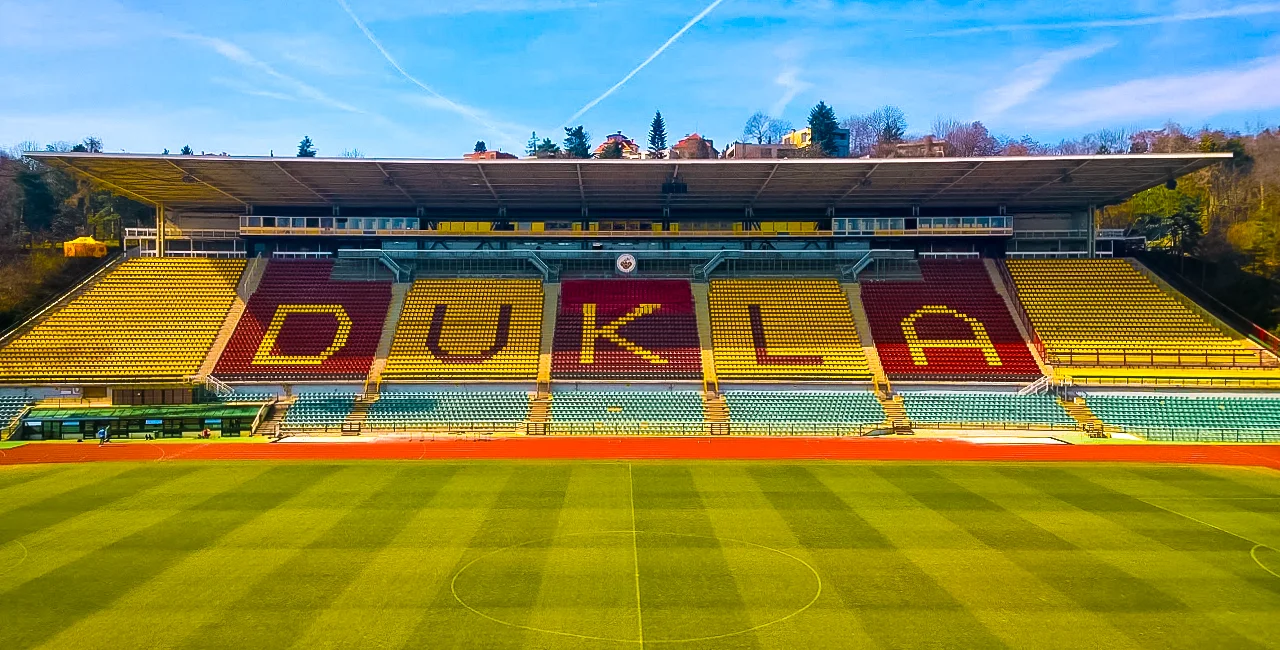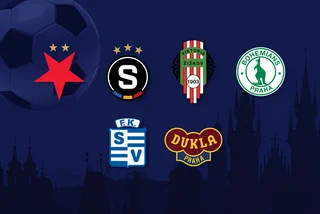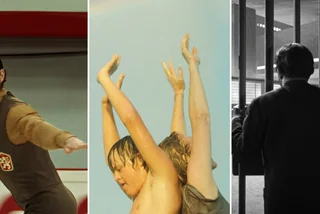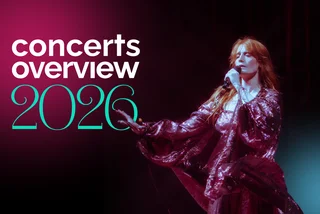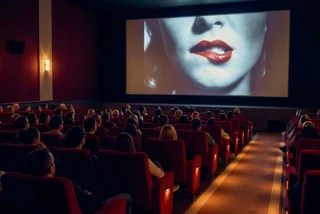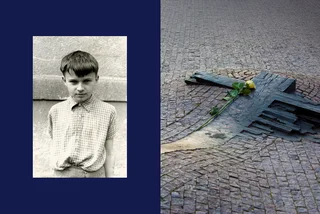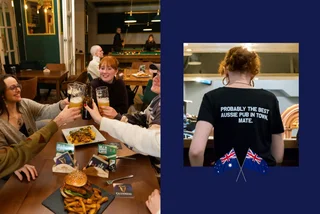The rivalry of Prague archenemies Slavia and Sparta has arguably dominated the Czech football scene in the last few decades. Still, neither team can take credit for inspiring a chart-topping UK hit, or an urban legend from the 1960s, when winning a prestigious football trophy didn’t get to one’s head. However, the Dukla football club does, and – in addition to a scenic location and advantageous ticket deals – also offers pundits and newcomers alike the chance to experience its lore with stadium tours.
In the beginning was Masopust
Taking pride of place in front of the Dukla stadium is a statue of Josef Masopust, an outstanding midfielder who in 1962 became the first Czechoslovak to receive the Golden Ball (Ballon d'Or) award given yearly to the best football player in Europe. An urban legend says that the statue shows Masopust as left-footed – which he wasn’t – in order to show how nimble he was with both his legs.
Fast facts to get the ball rolling
- Founded in 1948 as ATK (Army Sports Club) Praha, the club initially recruited its players from Czechoslovak men doing their mandatory military service.
- The team changed its name a decade after in reference to the World War II Battle of the Dukla Pass, which took place on the border between Poland and Slovakia in 1944.
- It plays its home matches at Juliska, a stadium belonging to the Army of the Czech Republic, with a capacity of 8,150 spectators.
- The club colors are red and yellow.
- In 1986, British band Half Man Half Biscuit released All I Want for Christmas is a Dukla Prague Away Kit, which earned Dukla a plethora of British fans, including the British political establishment.
- Comprising a total of around 500 children and young people, Dukla’s youth teams are both male and female, with player ages ranging from six to 19.
- Last but not least, Dukla’s women's team plays in the country’s top league.
Golden decades and the Golden Ball
One of the highlights of the tour is the room that hosts many of the trophies that Dukla won during its career, and photos of significant moments in its history. A memento of the club’s golden days is a replica of Masopust’s Golden Ball trophy. According to another urban legend immortalized in an image on display alongside the replica, on the day he received the trophy, Masopust put the trophy in a bag, and took the tram to head back home.
Masopust was also instrumental in helping the Czechoslovak team reach the 1962 FIFA World Cup Final, which it lost to Brazil with a score of 1-3. Still, the Czechoslovak midfielder made an impression on Pelé, with a photo of their meeting, complete with the autograph of the Brazilian football legend, on display in the club’s archives.
After its heyday in the 1960s, the club continued to reap awards on the international level, reaching the quarterfinals of the UEFA Cup in 1979, and the semifinals of the UEFA Cup Winners' Cup, a European football club competition contested annually by the winners of domestic cup competitions, in 1986. Before the breakup of Czechoslovakia, Dukla won the national championship 11 times, a number of wins that placed it right behind Sparta and Slavia.
Dukla Prague squad photo 1970#DuklaPrague #DuklaPraha pic.twitter.com/N1ccfvsr0Q
— Football Memories (@footballmemorys) December 29, 2023
The business of football
The club changed its ownership structure after the Czech Republic’s independence, when it became the property of a private person, while the military ended its financial support of the team. At the moment, Dukla pays for using the Juliska stadium, which in turn influences its financial decisions in other areas, such as the selection of the players.
“So you have to buy the players and the reputation of the club is not as high as Sparta's reputation is. Slavia's reputation, of course. So people do not want to go here and play for the club,” Dukla’s former sales and marketing manager Martin Šrámek told Expats.cz.
As is the case with other football clubs, Dukla relies on TV and ad revenue. Dukla owner Petr Paukner spoke out against the lack of transparency governing how the contracts were awarded in an interview with Aktuálně.cz, where he added that he was looking for a partner that would ease the financial strain on his personal finances, which support the club. “Dukla came back to life when it was almost dead, I invested a lot of money in her to keep her going,” he said.
Come for the football, stay for the view
Dukla fan or not, the top seats of the stadium offer an impressive view of Prague, all the way to the Prague castle, Vltava, the Troja bridge, Bohnice, Hotel International Prague, as well as new residential buildings mushrooming in the vicinity of the stadium.
Practical information: A regular ticket costs CZK 300, or CZK 270 when purchased online. Season tickets to the 2024/25 football season range from CZK 3,000 for standard seats to CZK 10,000 for VIP. Stadium tours start at CZK 2,000, depending on the size of the group, and need to be booked in advance. More ticket-price info and how to reserve to can be found here.
While the stadium has a capacity of 8,150 seats, the average attendance is currently less than 1,000 people per game, which, on a brighter note, means a relatively less rowdy atmosphere.
Šrámek told Expats.cz that the VIP tickets are particularly popular with tourists from the UK, Germany, and the U.S., as well as Scandinavia, where similar deals come at a much steeper price. He adds that 95 percent of people purchasing VIP tickets are foreigners.
Foodie tip: If you want to delight your taste buds with something tastier than the snacks available at the stadium, check out the food stalls by the entrance. In November, they featured Chilean culinary creations courtesy of Manquian, such as Empanada de Pino (thin dough filled with juicy beef and seasonings).
He adds that, given the club’s ownership structure, which doesn’t extend to the stadium, its main asset is the brand. “The brand and the reputation are the only thing we have and the only thing we can build on,” he says, adding that the military still owns the team’s logo, and that the team needs to pay a fee in order to use it.
Keeping an eye on the ball
The club has been gaining fans among the younger, tech-savvy generations by putting a new spin on club legends, such as Masopust, which have been reimagined as comic-book heroes illustrating collectible cards. A lesser-known club legend who also inspired a collectible card is Dukla’s 86-year-old club secretary.
Šrámek says that the club’s history carries a lot of weight for older, diehard fans, so any reimagining of its legacy needs to walk a fine line between past and present, adding that the collectible cards are a successful attempt, adding “people are loving them.”
On the up, despite problems
As a sign of changing times, Šrámek told Expats.cz that the club was serious about dealing with incidents of racism where Dukla fans targeted foreign players. Given that the premises of the stadium are monitored by cameras, club officials can single out the people behind the incidents and “tell them, ‘just don’t do this, don’t act primitive. You will get fined, we will get fined.’ And they usually stop as soon as you tell them that.” Šrámek adds that knowing all the fans and being able to talk to them one-on-one like that is an advantage of a smaller, tight-knit club that is similar to a family.
The club recently advanced to the Fortuna League, which is the first football league in Czechia; only the first and second leagues in the country are professional, meaning that the players earn a proper wage. This system is part of a wider problem regarding Czech sport, which is underfinanced, Šrámek said, meaning that in many cases teams or players receive no state funding. A partial exception concerns youth teams, which in some cases draw funds from local budgets, which in the case of the Dukla youth teams means Prague’s local budget.












 Reading time: 6 minutes
Reading time: 6 minutes 